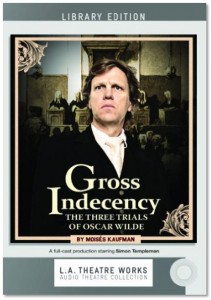‘Gross Indecency: The Three Trials of Oscar Wilde’
 An audio CD from L.A. Theatre Works
An audio CD from L.A. Theatre Works
Reviewed by Donalevan Maines
To paraphrase Will Rogers, I never met a play on tape I didn’t like. I can listen to the author’s words and use my imagination to see the show in my mind’s eye. The tapes (or CDs) are usually about two hours long, perfect for listening to on a short car trip, in contrast to an audio book that usually runs six to 10 hours.
The best producer of plays on tape is L.A. Theatre Works, and their new CD release, Gross Indecency: The Three Trials of Oscar Wilde, especially lends itself to this format because there probably isn’t a whole lot of action in a play composed from court transcripts, newspaper accounts, and writing of key players.
The “gross indecency” in the title refers to sodomy charges in 1895 against esteemed playwright (The Importance of Being Earnest), novelist (The Picture of Dorian Gray), and essayist Oscar Wilde, the married father of two children in Victorian England. The charges followed the first trial, in which Wilde accused the Marquess of Queensbury, of libeling him when he wrote of Wilde “posing as a somdomite [sic].”
Queensbury had no proof that Wilde was dallying with his son, Lord Alfred Douglas, and Wilde swore that he didn’t have sex with the young man on his “honor as an English gentleman” (Wilde was Welsh). The best Queensbury could allege was that Wilde “posed” as a homosexual, but in that era, it was enough to blacken a man’s reputation.
Proof of Wilde’s homosexuality came in the second and third trials, when male prostitutes, ranging in age from 16 to 22, testified that Wilde wined and dined them and plied them with gifts in return for sexual favors. To underscore how scandalous the prostitutes’ testimony was, Gross Indecency has the actors playing them appear in court in their underwear.
From the apex of British society, Wilde was toppled into humiliation and ruin from which he never recovered.
Simon Templeman as the once-celebrated wit leads a cast that includes Julian Sands (A Room with a View). Among the real-life characters depicted are writer George Bernard Shaw and royal Queen Victoria.
The running time for Gross Indecency is 139 minutes because it includes an insightful backstage interview with its author, Moises Kaufman, the gay, Venezuelan-born co-founder of Tectonic Theater Project, which developed The Laramie Project. Also, Kaufman was nominated for a Tony Award as best director for I Am My Own Wife, the one-man play about German transvestite Charlotte von Mahlsdorf.
Kaufman’s interview reveals that he envisioned the play in three stages: (1) the first trial: reality; (2) the second trial: deeper into Oscar Wilde’s mind; and (3) the third trial: inside Wilde’s madness and despair.
The second act of the production begins with Kaufman questioning Wilde scholar Marvin Taylor, a professor at New York University. He explains that, prior to Wilde’s public ordeal, there was no “kind of person,” no gay identity for a man who had sex with another man. The “disruption of class, gender, and sexuality” that captivated England during the trials of Oscar Wilde “released these ideas into western culture,” says Taylor.
Wilde himself concluded, “The real tragedies of life occur in such an inartistic manner.”
Donalevan Maines is a regular contributor to OutSmart magazine.











Comments